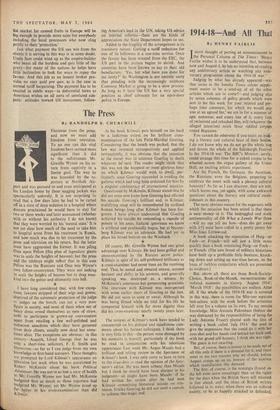The Press
By RANDOLPH S. CHURCHILL
FREEDOM from the press; and now we must add freedom from television. To no one can this vital freedom have seemed more significant than it did to the unfortunate Mr. Greville Wynne on his re- turn from captivity in a Soviet gaol. The way he was hounded by the re- porters at Northolt Air- port and was pursued to and even anticipated at his London home by these nagging jackals was spectacularly unlovely. It is not surprising to read that a few days later he had to be carted off in a state of deep sedation to a hospital where doctors proclaimed he would have to stay for two or three weeks and later announced (whether With or without his authority I do not know) that they were worried by his 'mental state.' It is not yet clear how much of the need to take him to hospital arose from his treatment in Russia, and how much was due to his treatment by the press and television on his return. But the latter must have aggravated the former. It was piling Ossa upon Pelion (this plan of legendary giants was to scale the heights of heaven); but the press and the teleboys might reflect that in this case Pelion was the Russians and Ossa was Wynne's own fellow-countrymen. They were not seeking to scale the heights of heaven but to drag man- kind into the gutter and ultimately into hell.
I have long considered that, with few excep- tions, lawyers stripped of their wigs and gowns, deprived of the automatic protection of the judge ° judges on the bench, can cut a very poor figure in society, and most of them when out of fancy dress reveal themselves as men of straw, unfit to participate in grown-up conversation 'Peet from retailing a few well-polished and indiscreet anecdotes which they have garnered from their clients, usually now dead but some- times alive. The exceptions are obvious: in this century—Asquith, Lloyd George (but he was only a short-time solicitor), F. E. Smith and Shawcross—so far as I can judge from my own knowledge or first-hand accounts. These thoughts ate prompted by Lord Kilmuir's appearance on television last week when he was questioned by Robert McKenzie about his book Political Adventure. He was not in so low a state of health as Mr. Greville Wynne nor had Mr. McKenzie badgered him as much as those reporters had badgered Mr. Wynne; yet Mr. Wynne stood up far better to his cross-examination than did Kilmuir. in his book Kilmuir pats himself on the .back to a ludicrous extent on his brilliant cross- examination of the late Field-Marstial Goering. Considering that the bench was packed, that the law was invented retrospectively and applied retroactively, it was obvious that the intention at the outset was to sentence Goering to death whatever hi' said. The reader might think that this was not the happiest or.most glorious hour on which Kilmuir would wish. to dwell, par- ticularly since Goering succeeded in evading the gallows which had long been ordained for him by a singular confederacy of international injustice.
Questioned by M cKeniie, Kilmuir stated that he did not even now know how Goering had effected his suicide. Goering's brilliant and, to Kilmuir, stultifying coup will be remembered by civilised human beings long after Kilmuir has been for- gotten. I have always understood that Goering achieved his suicide by concealing a capsule of poison in his anus. Judicial ignorance we, know is artificial and profoundly bogus, but at Nurem- berg Kilmuir was an advocate. He had yet to place his broad bottom on the Woolsack. * Of course, Mr. Greville Wynne had one great advantage over Kilmuir. He had been grilled and cross-examined by the Russian secret police. Kilmuir in spite of his self-professed brilliance as a cross-examiner had never been on the receiving end. Thus he oozed and sweated unease, seemed hesitant and shifty in his answers, and generally speaking was destroyed as a witness by McKenzie's courteous but persevering questions. The interview with Kilmuir was interspersed with some earlier shots of Goering in the box. He did not seem to ooze or sweat. Although he was being filmed while on trial for his life he comported himself with far more dignity than did his cross-examiner nearly twenty years later.
* The reviews of Kilmuir's book have tended to concentrate on his disloyal and injudicious com- ments about his former colleagues. I think there is very little in this—the person most damaged by his memoirs is himself, particularly if the book he read in conjunction with his television appearance. Last week Mr. Angus Maude had a brilliant and telling review in the Spectator of Kilmuir's book. I was only sorry to have to turn, to the Guardian to read the opinion of the Spec- tator's editor. He was more urbane than Maude but I think he would have been sharper in his judgment—as might have been Maude—if he had written his review after he had seen Kilmuir committing historical suicide on tele- vision. Unlike Goering he did not need a capsule to achieve this tragic end.














































 Previous page
Previous page